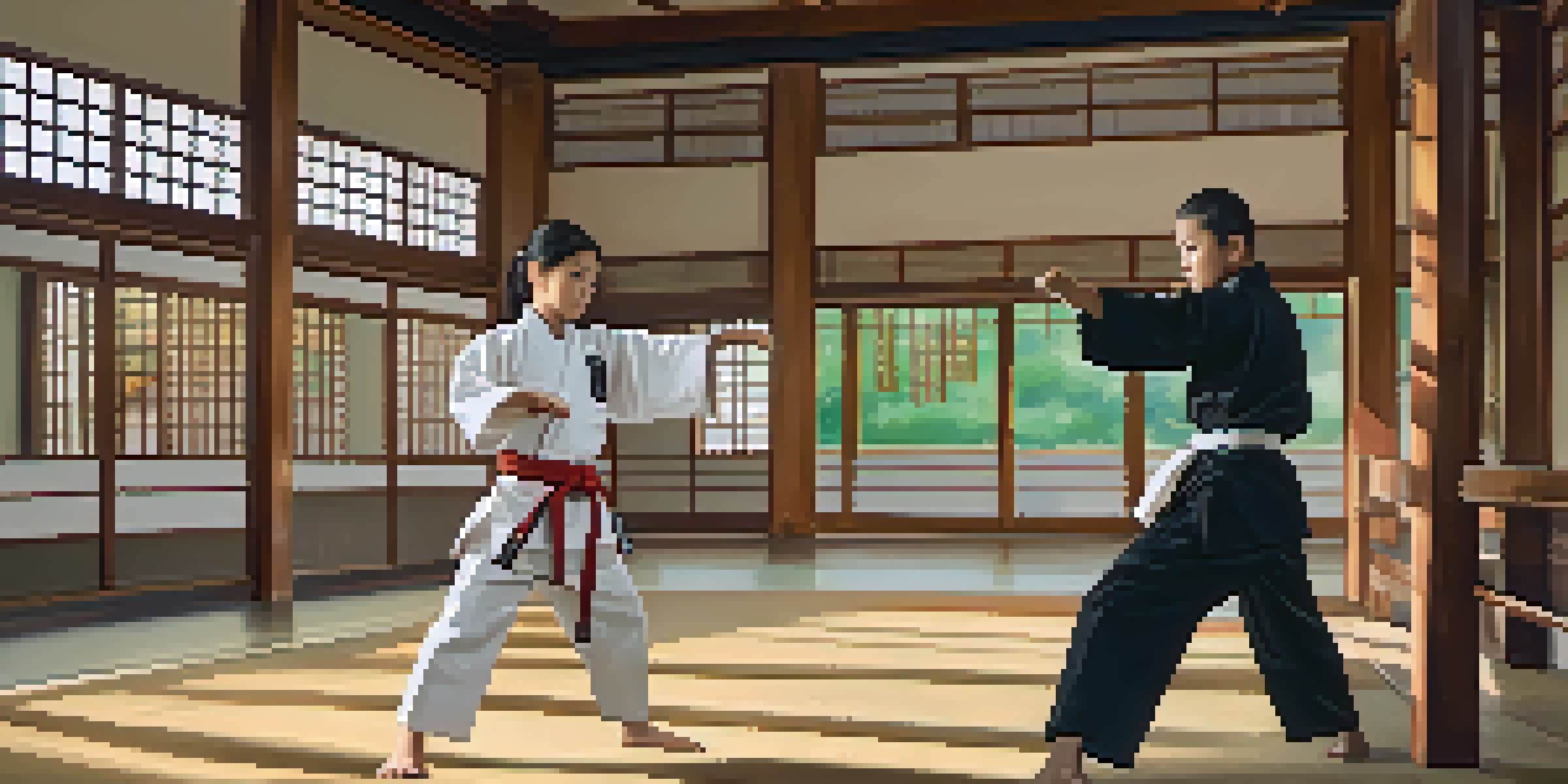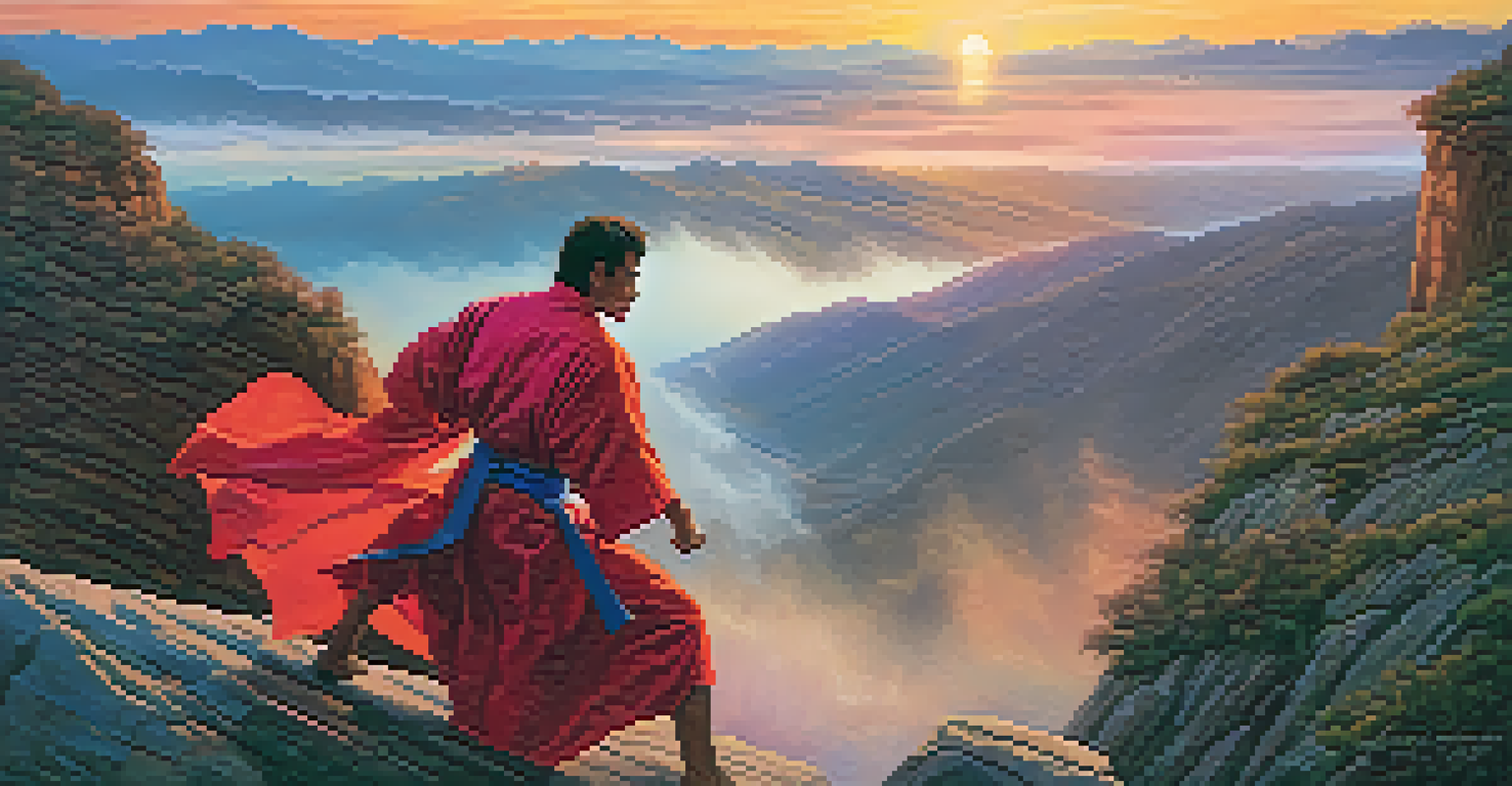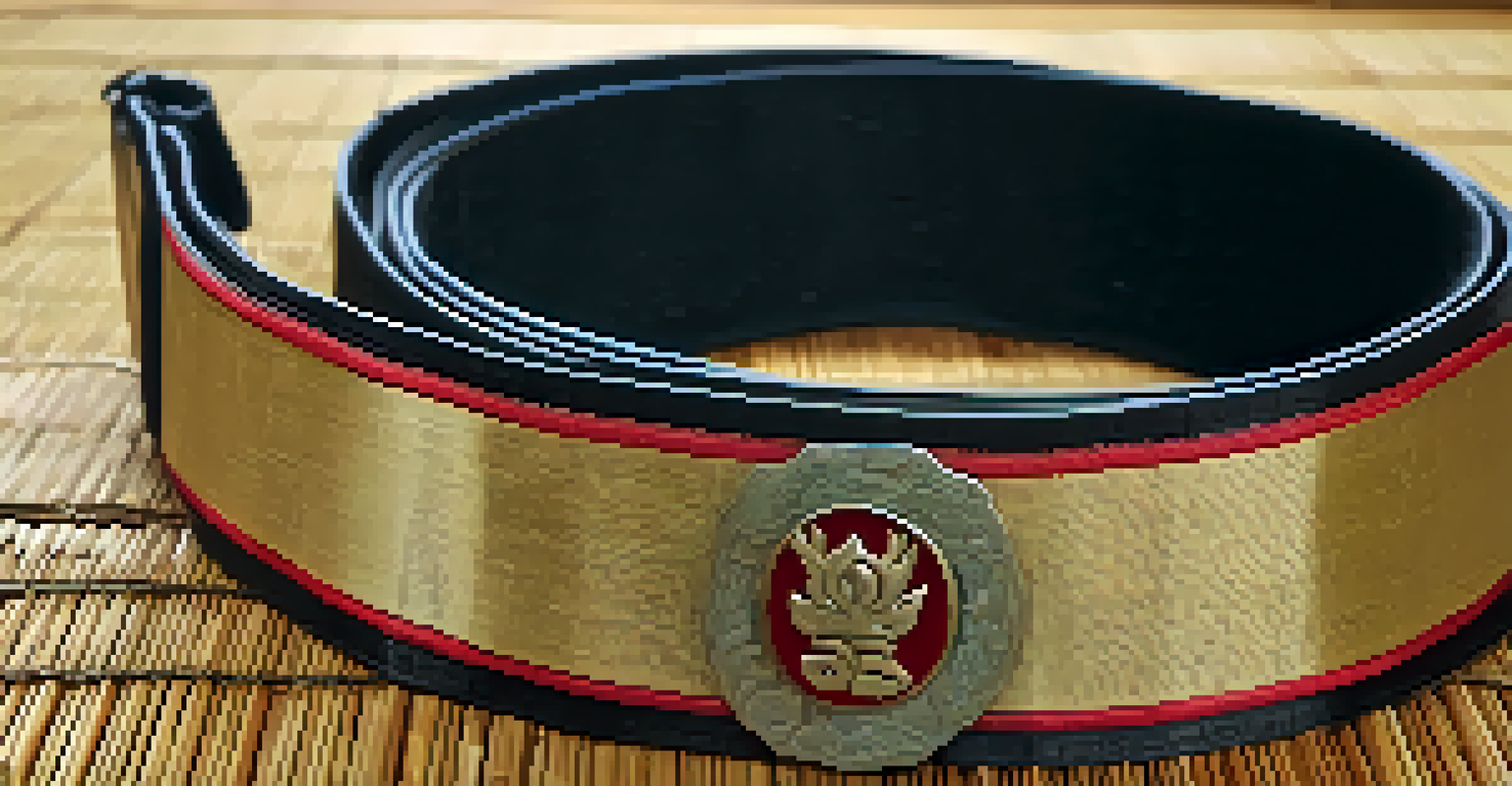The Role of Martial Arts in Shaping Hero Archetypes in Film

Understanding Hero Archetypes in Film
Hero archetypes serve as foundational characters in storytelling, embodying traits that audiences can relate to or aspire to. From the brave knight to the reluctant hero, these archetypes guide viewers through a narrative journey. They form a connection with the audience, allowing for deeper emotional engagement and investment in the story.
The journey of a thousand miles begins with one step.
In film, these archetypes often reflect societal values and personal struggles, making them timeless and universal. As viewers, we find comfort in familiar character types while also enjoying the unique twists that each story presents. This is where martial arts come into play, adding layers of complexity to these archetypical figures.
Martial arts heroes often embody the journey of self-discovery and discipline, showcasing not just physical prowess but also moral strength. This duality enriches their character, allowing them to resonate with wider audiences and elevate the storytelling experience.
The Influence of Martial Arts on Hero Development
Martial arts often serve as a transformative journey for a character, illustrating their growth through rigorous training and overcoming challenges. This process not only enhances their physical abilities but also their mental and emotional resilience. Such development is crucial for heroes as it sets the stage for their ultimate confrontation with antagonists.

For example, in films like 'The Karate Kid', we see the protagonist Daniel LaRusso grow from a bullied teen to a confident fighter through martial arts training. His journey embodies the classic hero's arc, proving that transformation is key to becoming a hero. This evolution is a significant part of what makes the story compelling.
Hero Archetypes Enhance Narratives
Hero archetypes, especially in martial arts films, deepen emotional engagement by reflecting personal struggles and societal values.
Moreover, martial arts can symbolize a hero's internal struggle. The discipline required in martial arts often mirrors the character's fight against personal demons, creating a relatable and inspiring narrative. This depth adds layers to hero archetypes, making them more than just physical fighters.
Cultural Context: Martial Arts in Hero Narratives
Martial arts in film are often deeply rooted in the cultural narratives of their origin, showcasing traditions and philosophies that shape the heroes’ journeys. For instance, films like 'Crouching Tiger, Hidden Dragon' reflect the values of honor, loyalty, and the struggle between personal desires and duty. These cultural elements enrich the character's journey, making it resonate on a deeper level.
It’s not whether you get knocked down, it’s whether you get up.
By incorporating diverse martial arts styles, filmmakers can present a variety of hero archetypes that embody different cultural values. This not only diversifies the portrayal of heroes but also invites audiences to understand and appreciate different perspectives. It highlights the universal themes of struggle, growth, and redemption found in martial arts narratives.
Additionally, the cultural backstory often informs the hero's motivations, making their journey more relatable. Whether it’s a samurai fighting for honor or a street fighter seeking redemption, cultural context enhances the narrative and shapes how audiences perceive these heroes.
The Physicality of Martial Arts in Action Sequences
The dynamic nature of martial arts brings a unique physicality to action sequences, which is integral to shaping a hero's character. These sequences often depict not just physical battles but also the emotional stakes involved, allowing for a deeper connection with the audience. When heroes engage in martial arts, it becomes a dance of strategy, skill, and emotional expression.
For instance, in 'Kill Bill', the protagonist, The Bride, showcases her martial arts skills as a means of revenge. The choreography of the fight scenes reflects her emotional turmoil and determination, enhancing the narrative's impact. This combination of action and emotion is what makes martial arts films so compelling.
Martial Arts Symbolize Growth
Martial arts training represents a hero's journey of self-discovery and resilience, emphasizing that true strength comes from overcoming internal challenges.
Moreover, the use of martial arts in action sequences often serves to highlight the hero's growth throughout the film. Each fight becomes a testament to their journey, showcasing how far they've come from their initial struggles. This not only entertains but also inspires audiences, as they witness the hero's evolution through their combat prowess.
Martial Arts as a Metaphor for Personal Growth
In many films, martial arts act as a metaphor for personal growth and self-discovery, illustrating that true strength lies in overcoming one's limitations. The rigorous training and discipline required in martial arts often parallel the internal battles faced by heroes. This symbolism makes the martial arts journey relatable to audiences who are also striving for personal improvement.
For example, in 'Rocky', the protagonist Rocky Balboa's training montage is not just about physical preparation; it represents his determination to rise above challenges. This powerful metaphor resonates with viewers, reinforcing the idea that perseverance and hard work lead to success. Such narratives encourage audiences to reflect on their own paths to growth.
Additionally, martial arts can signify the journey of mastering oneself rather than just defeating an external opponent. The focus on discipline, respect, and inner peace highlights the hero’s transformation into a more rounded individual. This deeper meaning elevates the role of martial arts in film, making it a powerful narrative tool.
The Role of Mentorship in Martial Arts Films
Mentorship is a recurring theme in martial arts films, often showcasing the relationship between a mentor and a hero as pivotal to their development. This dynamic not only highlights the importance of guidance but also emphasizes the transfer of knowledge and values. The mentor-mentee bond often serves as a catalyst for the hero's growth and transformation.
For instance, in 'The Karate Kid', Mr. Miyagi's teachings go beyond physical combat; they encompass life lessons that shape Daniel's character. This relationship illustrates how mentorship can help heroes navigate their challenges, both in martial arts and in life. It reinforces the idea that heroes don’t achieve greatness alone; they often rely on the wisdom of others.
Mentorship Shapes Hero Development
The mentor-mentee relationship is crucial in martial arts films, providing guidance that significantly influences a hero's growth and transformation.
Moreover, the presence of a mentor often adds emotional depth to the story, making the hero's journey more relatable. As viewers, we can see the impact of mentorship on the hero's growth and appreciate the sacrifices made for their success. This element enriches the narrative and reinforces the significance of community and support in the hero's journey.
Concluding Thoughts: Martial Arts and Hero Archetypes
The integration of martial arts in film significantly shapes the portrayal of hero archetypes, enriching their narratives and enhancing audience engagement. Through physicality, cultural context, and themes of personal growth, martial arts serve as a powerful vehicle for storytelling. They illustrate that heroes are not just defined by their strength but also by their journey and transformation.
As we see in countless films, martial arts characters often embody the struggle between good and evil while also reflecting real-life challenges. This duality makes them relatable and inspires viewers to embrace their own journeys. The lessons learned through martial arts—discipline, perseverance, and respect—are universal and resonate with audiences around the world.

In conclusion, the role of martial arts in shaping hero archetypes in film is profound and multifaceted. As filmmakers continue to explore these narratives, audiences can expect to see even more compelling stories that celebrate the transformative power of martial arts and the heroes who embody their principles.